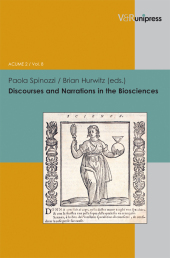 Neuerscheinungen 2011Stand: 2020-01-07 |
Schnellsuche
ISBN/Stichwort/Autor
|
Herderstraße 10
10625 Berlin
Tel.: 030 315 714 16
Fax 030 315 714 14
info@buchspektrum.de |

Brian Hurwitz, Paola Spinozzi
(Beteiligte)
Discourses and Narrations in the Biosciences
Ed. by Paola Spinozzi and Brian Hurwitz
2011. 299 S. 24.5 cm
Verlag/Jahr: V&R UNIPRESS 2011
ISBN: 3-89971-831-3 (3899718313)
Neue ISBN: 978-3-89971-831-7 (9783899718317)
Preis und Lieferzeit: Bitte klicken
Discourses and Narrations in the Biosciences investigates the forms of writing in which scientific claims are formulated and announced. Argumentative strategies, compositional rules, and figurative expressions in communication and narrativization of scientific knowledge are the focus of interdisciplinary contributions by humanities and science scholars.The first part of the book, dedicated to ´Rhetorical and Epistemological Aspects of Science Writing´, addresses how scientific pursuits and methods feed into multi-level texts that generate responses within science, society, and culture. The second part, entitled ´Bioscientific Discourses and Narrations´, examines popularizations and fictionalizations of science in relation to diversity, deviancy, ageing, illness, reproduction, the evolution of humankind, mathematical models of biomedical systems, and the myth of the heroic scientist.Assessing the narrative impetus and command of literary and meta-discoursive strategies shown by contemporary science writers enhances understanding of the methods and conventions through which the biosciences produce knowledge.
Discourses and Narrations in the Biosciences investigates the forms of writing in which scientific claims are formulated and announced. Argumentative strategies, compositional rules, and figurative expressions in communication and narrativization of scientific knowledge are the focus of interdisciplinary contributions by humanities and science scholars.The first part of the book, dedicated to ´Rhetorical and Epistemological Aspects of Science Writing´, addresses how scientific pursuits and methods feed into multi-level texts that generate responses within science, society, and culture. The second part, entitled ´Bioscientific Discourses and Narrations´, examines popularisations and fictionalizations of science in relation to diversity, deviancy, ageing, illness, reproduction, the evolution of humankind, mathematical models of biomedical systems, and the myth of the heroic scientist.Assessing the narrative impetus and command of literary and meta-discoursive strategies shown by contemporary science writers enhances understanding of the methods and conventions through which the biosciences produce knowledge.


